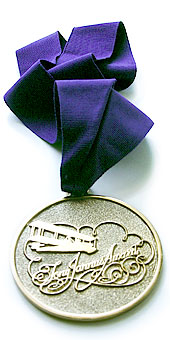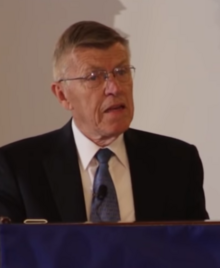
An airline is a company that provides air transport services for traveling passengers and/or freight. Airlines use aircraft to supply these services and may form partnerships or alliances with other airlines for codeshare agreements, in which they both offer and operate the same flight. Generally, airline companies are recognized with an air operating certificate or license issued by a governmental aviation body. Airlines may be scheduled or charter operators.

Air Florida was an American low-cost carrier that operated under its own brand from 1972 to 1984. During the period from 1972 to 1978 Air Florida was an intrastate airline. Until a high-profile 1982 aircraft crash in Washington DC, Air Florida was considered an early success story of U.S. airline deregulation, having expanded rapidly from its original Florida network, including internationally to Europe and Latin America. After the crash, the airline struggled for over two and a half years before finally succumbing to bankruptcy in 1984.
Pacific Southwest Airlines (PSA) was a low-cost US airline headquartered in San Diego, California, that operated from 1949 to 1988. It was the first substantial scheduled discount airline. PSA called itself "The World's Friendliest Airline" and painted a smile on the nose of its airplanes, the PSA Grinningbirds. The Los Angeles Times called PSA "practically the unofficial flag carrier airline of California for almost forty years."

Braniff Airways, Inc., operated as Braniff International Airways from 1948 until 1965, and then Braniff International from 1965 until air operations ceased, was a United States trunk carrier, a scheduled airline that operated from 1928 until 1982 and continues today as a retailer, hotelier, travel service and branding and licensing company, administering the former airline's employee pass program and other airline administrative duties. Braniff's routes were primarily in the midwestern and southwestern United States, Mexico, Central America, and South America. In the late 1970s it expanded to Asia and Europe. The airline ceased air carrier operations in May 1982 because of high fuel prices, credit card interest rates and extreme competition from the large trunk carriers and the new airline startups created by the Airline Deregulation Act of December 1978. Two later airlines used the Braniff name: the Hyatt Hotels-backed Braniff, Inc. in 1983–89, and Braniff International Airlines, Inc. in 1991–92.
Airline deregulation is the process of removing government-imposed entry and price restrictions on airlines affecting, in particular, the carriers permitted to serve specific routes. In the United States, the term usually applies to the Airline Deregulation Act of 1978. A new form of regulation has been developed to some extent to deal with problems such as the allocation of the limited number of slots available at airports.
Gordon M. Bethune is a retired US airline executive. He was the CEO of Continental Airlines from 1994 until his retirement at the end of 2004. He formerly served on the boards of Honeywell and Prudential Financial. Bethune was known for ensuring that he received some time as a pilot when taking delivery of a new Continental Airlines Boeing 767 from Boeing and repositioning it from Seattle to Houston.
William A. "Pat" Patterson was the President of United Airlines from 1934 until 1966.

Herbert David Kelleher was an American billionaire airline businessman and lawyer. He was the co-founder, later CEO, and chairman emeritus of Southwest Airlines until his death in 2019.
Howard D. Putnam is an American businessman. He was CEO of Southwest Airlines for three years, and later CEO of Braniff International Airways at the time of its bankruptcy.

Paul Revere Braniff was an airline entrepreneur. Braniff was one of the original founders of Braniff International Airways. He served as a mechanic in World War I in the United States Army and then as a pilot in World War II.

Antony Habersack Jannus, more familiarly known as Tony Jannus, was an early American pilot whose aerial exploits were widely publicized in aviation's pre-World War I period. He flew the first airplane from which a parachute jump was made, in 1912. Jannus was also the first airline pilot, having pioneered the inaugural flight of the St. Petersburg–Tampa Airboat Line on January 1, 1914, the first scheduled commercial airline flight in the world using heavier-than-air aircraft. The Tony Jannus Award, created to perpetuate his legacy, recognizes outstanding individual achievement in the scheduled commercial aviation industry and is conferred annually by the Tony Jannus Distinguished Aviation Society founded in Tampa, Florida, in 1963.

William Douglas Parker is an American businessman who is the chairman of American Airlines Group, the parent company of American Airlines. Parker previously served as chief executive officer of the airline from 2001 to 2023.

Robert Forman Six was an American businessman who was the CEO of Continental Airlines from 1936 to 1980. Beginning his career in the early days of commercial aviation in the United States, his time as Continental Airlines CEO saw it become one of the world's largest and most profitable legacy airlines.

Braniff Inc. was a US-based airline that operated flights from 1984 until 1989 and was partially formed from the assets of the original Braniff International Airways. The domestic air carrier was originally headquartered at Dallas Love Field in Dallas, Texas, and later Orlando, Florida. The airline is sometimes referred to as "Braniff II".

Juris George Mikelsons was a former airline executive and airline pilot in the United States and the founder of ATA Airlines. He was born in Riga, Latvia, in 1938 on the eve of World War II. His family fled to Germany during the mid-1940s to escape the Soviet occupation of the Baltic states.

The Tony Jannus Award recognizes outstanding individual achievement in scheduled commercial aviation by airline executives, inventors and manufacturers, and government leaders. The award is conferred annually by the Tony Jannus Distinguished Aviation Society and was first bestowed in 1964 in Tampa, Florida, U.S. Its namesake, aviation pioneer Tony Jannus, piloted the inaugural flight of the St. Petersburg–Tampa Airboat Line on January 1, 1914, the first scheduled commercial airline flight in the world using heavier-than-air aircraft. In addition to preserving the legacy of Tony Jannus, the non-profit Society also offers financial assistance to college students pursuing studies in aviation and conducts an annual essay contest for high school students to encourage careers in aviation.

The Benoist XIV, also called The Lark of Duluth, was a small biplane flying boat built in the United States in 1913 in the hope of using it to carry paying passengers. The two examples built were used to provide the first heavier-than-air airline service anywhere in the world, and the first airline service of any kind at all in the United States.

Charles Edward Acker is an American businessman who was CEO of Braniff Airways, Air Florida, and Pan American World Airways. He is a principal at Intrepid Equity Group.
This is the history of Braniff International Airways.

William R. Howard was an American businessman and airline executive. He was best known as the Chairman and CEO of Piedmont Airlines, growing it from a small regional airline to a major US carrier throughout the post deregulation environment of the late 1970s and 1980s. He was also involved in many other business ventures throughout his career.














